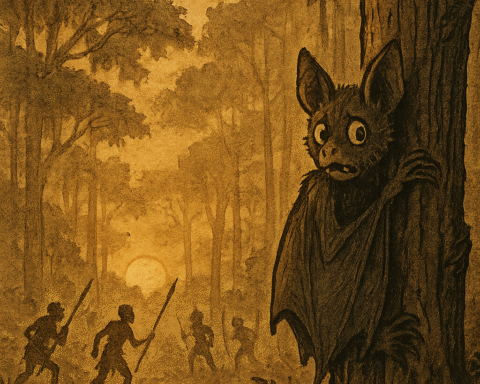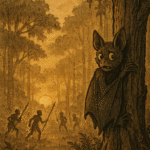In a time when poverty could mark a man more deeply than tribal scars, there lived a young man whose misfortune seemed woven into the very fabric of his existence. Death had claimed both his father and mother, leaving him with nothing but empty hands and an emptier stomach. His fields lay barren, yielding not even the humblest of crops, while his granary remained as hollow as his hopes for the future.
No woman in the village would cast favorable eyes upon him, for what maiden dreams of marrying a man who cannot provide even basic sustenance? The cruel tongues of his neighbors had dubbed him “the village scarecrow” a walking reminder of failure that frightened away prosperity rather than attracting it. The sting of their mockery drove him daily into the forest’s embrace, where the judgmental eyes of his community could not follow and where the trees offered silent companionship to his wounded spirit.
One morning, as hunger gnawed at his belly with the persistence of a termite boring through wood, he shouldered his rusty cutlass and worn axe, determined to carve a future from the wilderness. The familiar paths of the forest no longer satisfied his desperate search for fertile ground, so he ventured deeper into territories unknown, where ancient trees stood like pillars supporting the roof of the world.
Also read: The Magical Hunting Dog
Exhaustion finally forced him to rest beneath a towering mahogany whose trunk could have sheltered an entire family. The shade provided relief from the scorching sun, but his empty stomach cramped with pain that made him dizzy and weak. He searched the surrounding trees with desperate eyes, hoping to spot wild fruits hanging from the branches, but the forest seemed as barren as his own fields.
Then, as if materialized from the very essence of the forest itself, an old woman appeared before him. Her presence carried the weight of countless seasons, and her eyes held depths that spoke of wisdom both ancient and terrible.
“Mother, are you lost?” he asked, his voice hoarse with hunger and surprise.
“Where are you from?” she replied, studying him with an intensity that seemed to pierce through skin and bone to examine his very soul.
“Father-Mine and Mother-Mine have died,” he answered honestly, his words heavy with the grief that never quite left him. “I am looking for a place to plant some seeds.”
The old woman’s command came swift and unexpected: “Give me that cutlass and axe.”
Without hesitation, perhaps driven by desperation or some supernatural compulsion, he handed over his tools—the only possessions that marked him as more than a beggar. The weight of their absence left his shoulders feeling strangely light.
“Turn around. Take off your clothes,” she commanded with the authority of one accustomed to absolute obedience.
The man turned his back to the mysterious woman, his fingers trembling as he removed his brown, tattered singlet and the simple loincloth that provided his only dignity. The fabric, thin from countless washings and rough from years of wear, fell away like shed skin. As he finished undressing and lifted his eyes to survey his surroundings, the world transformed completely.
Gone was the familiar forest with its towering mahogany and dappled sunlight. Instead, he found himself standing in a magnificent country where golden light seemed to emanate from the very air itself. The people of this miraculous realm welcomed him with joy radiating from their faces like sunshine after storm clouds. Without ceremony or explanation, they escorted him to a palace that defied every definition of grandeur he had ever imagined.
Before he could fully comprehend the magnitude of his transformation, a jeweled crown was placed upon his head, and voices throughout the palace proclaimed him their king. The poor man who had been mocked as a scarecrow now held dominion over a realm of unimaginable wealth and beauty.
A nkwob, the most senior of all the palace nobles, became his guide through this new world. The tour stretched across an entire day as they explored living quarters furnished with luxury beyond dreams, ceremonial grounds where gold and silver caught the light like captured stars, and gardens where every flower seemed to bloom in perfect harmony. The king’s new domain stretched as far as his eyes could see, offering him everything a man could desire.
Finally, as evening shadows began to paint the palace walls in shades of purple and gold, they came to a single door that stood apart from all the others. The nkwob bowed deeply, his voice carrying the weight of absolute solemnity: “Mbeh, everything in this palace is yours, but you should never open this door. It is the sacred door.”
Years flowed by like a gentle river, and the king settled into his role with surprising skill. He governed with wisdom and compassion, earning the deep love of his subjects who prospered under his benevolent rule. The gods smiled upon his reign, blessing him with many children whose laughter filled the palace halls. By every measure, he should have been the happiest of men.
Yet, as the Beba people say, his throat remained bitter desperately, painfully bitter. The forbidden door haunted his every waking moment and invaded his dreams with its terrible mystery. “Why shouldn’t I touch that door?” he would mutter to himself in the dark hours before dawn. “Am I not the king? Have I not been good to my people? Why am I being treated as if I were a stranger in my own palace? What secrets hide behind that door?”
His teeth would gnash with frustration as the sacred door tormented his mind like a persistent itch that could never be scratched. The man who ruled an entire kingdom found himself enslaved by curiosity more binding than iron chains. He vowed that somehow, someday, he would discover what lay beyond that forbidden threshold after all, was he not the king?
His opportunity finally arrived during the most sacred celebration of the year: the nwa ngeh, the Feast of the Cutting-of-the-Grass. This annual festival brought together the entire kingdom in gratitude and reverence. The king provided abundant food and drink, and his subjects celebrated with hearts full of joy. They performed the traditional nwa ngeh ceremonies, invoking their gods with voices raised in ancient songs of thanksgiving.
Together, they expressed gratitude for the life-giving rains, for the blessing of new births, for the gift of good health, and for the bountiful harvests that filled their granaries. Libations flowed freely as they poured precious palm wine upon the earth, killed a ceremonial goat whose blood would carry their prayers to the ancestors, and spoke incantations designed to ward off enemies, evil omens, and all those who would bring harm to their peaceful realm.
The celebration continued deep into the night with eating, drinking, dancing, and singing that echoed across the kingdom like thunder rolling through valleys. But when the festivities finally ended and his satiated subjects stumbled to their beds in states of exhausted contentment, the king found sleep impossible to achieve.
As the palace settled into the profound silence that follows great celebrations, one lonely figure began roaming the halls. The king’s tortured mind whispered into the darkness: “Today is the day I must open that door. If I don’t open it on a sacred day like this the annual day of reckoning when can I? A sacred day like this one merits the opening of the sacred door.”
His bare feet moved silently across cold stone floors as he navigated the graveyard quiet of the sleeping palace. Each step brought him closer to the forbidden threshold that had dominated his thoughts for years. His heart hammered against his ribs like a caged bird desperate for freedom as he approached the sacred door.
With trembling hands, he gently turned the handle and stepped across the threshold that had been denied to him for so long. The door closed behind him with a soft click that seemed to echo through eternity.
Suddenly, shivers shot down his spine like lightning striking earth. The magnificent palace, his royal robes, his crown all had vanished like morning mist touched by sunlight. He stood completely naked in the forest clearing, his skin exposed to the cool air that raised goosebumps across his flesh.
The old woman sat exactly where he had first encountered her, beneath the same mahogany tree, as if no time had passed at all. Her ancient eyes held no surprise, only the patient wisdom of one who had witnessed this scene countless times before.
“Here are your things,” she said simply, extending her weathered hands to offer his ragged clothes, his rusty cutlass, and his worn axe the same poor possessions he had carried into the forest so many years ago.
Moral Lesson
This profound tale warns against the destructive power of insatiable curiosity and the inability to accept boundaries, even when those limits are clearly established for our own protection. The story teaches that some doors should remain closed, that contentment comes from appreciating what we have rather than obsessing over what is forbidden, and that violating sacred trusts no matter how justified we feel can cost us everything we hold dear.
Knowledge Check
Q1: What role does the old woman play in this Cameroon folktale? A1: The old woman serves as a supernatural guardian or tester who grants the poor man a kingdom but establishes clear boundaries, ultimately teaching him about the consequences of violating sacred trusts.
Q2: What is the significance of the nwa ngeh festival in this story? A2: The nwa ngeh (Feast of the Cutting-of-the-Grass) represents the most sacred day of the year when people give thanks to gods and ancestors, making the king’s violation of the sacred door even more spiritually significant.
Q3: Why does the king ultimately open the forbidden door? A3: The king’s “bitter throat” represents his consuming curiosity and inability to accept limitations on his power, showing how obsession with forbidden knowledge can destroy even the greatest blessings.
Q4: What does the sacred door symbolize in this African legend? A4: The sacred door represents boundaries that must be respected, forbidden knowledge that comes with terrible costs, and the testing of character through the ability to accept limitations.
Q5: How does this folktale reflect traditional African beliefs about supernatural gifts? A5: The story demonstrates that supernatural blessings often come with conditions and tests, and that violating the terms of divine gifts results in immediate loss of those benefits.
Q6: What cultural lesson does this tale teach about leadership and humility? A6: The story warns that even kings must respect sacred boundaries and that true leadership requires the wisdom to know when not to exercise power, showing that humility preserves blessings while pride destroys them.
Source: The sacred door and other stories: Cameroon folktales of the Beba,” Ohio University Press.





